13届 中考英语复习资料
- 格式:doc
- 大小:367.50 KB
- 文档页数:177

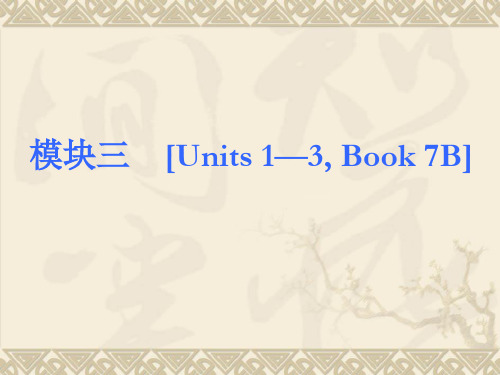

2013中考总复习资料1Grammar Focus 专题What time do you go to school?I‟d like some noodles.What do they do on weekends? They often go to the movies.What does he do on weekends? He sometimes watches TV.How often do you shop? I shop once a month.How often does Cheng watch TV? He watches TV twice a week.I have a headache. You should go to bed.He has a stomachache, He shouldn‟t eat anything.She has a toothache. She should see a dentist.What are you doing for vacation? I‟m visiting my grandmother.What‟s she doing for vacation? She‟s going camping.What are they doing for vacation? They‟re relaxing at home.When are you going? I‟m going on Monday.When is he going? He‟s going on the 12th.When are they going? They‟re going next week.How do you get to school? I ride my bike.How does he get to school? He walks to school.How do they get to school? They take the train.How long does it take? It takes about forty minutes.Can you come to my party? Sure, I‟d love to. I‟m sorry, I can‟t. I have to help my mom. Can she go to the movies? No, she can‟t .She‟s playing soccer.Can he go to the baseball game? No, he can‟t. He has to study.Can they go to the concert? No, they can‟t. They‟re going to a party.Pedro is funnier than Paul. Tina is taller than Tara. Tom is more athletic than Sam.How many bananas do we need? Three.How much yogurt do we need? Once cup.How do you make a banana milk shake? Peel the bananas. Pour the milk into the blender. Did you go to the zoo? No, I didn‟t. I went to the aquarium..Did you see any seals? Yes, I saw some seals.Were there any sharks? No, there weren‟t any sharks.When was he born? He was born in 1895.How long did he hiccup? He hiccupped for 69 years and 5 months.When did he start hiccupping? He started hiccupping in 1922.What are you going to be when you grow up? I‟m going to be an actor.How are you going to do that? I‟m going to take acting to lessons.Could you please clean your room? Yes, sure.Could you please do the dishes? Sorry, I can‟t. I have to do my homework.Could I go to the movies? Yes, you can.Could I use the car? No, you can‟t. I have to go out.-est Town Cinema is the cheapest.-iest It has the friendliest service.most Movie Palace has the most comfortable seats.Good Jason‟s and Trendy Teens are good stores.Better Trendy Teens has better service.Best Jason‟s has the best quality clothing.Bad Oldies 102.1 FM is pretty bad.Worse It‟s worse than all talk 970 AM.Worst It has the worst music.Unit 1Will there be less pollution? No, there won‟t. There will be more pollution.·Will there be fewer trees? Yes, there will.·Kids won‟t go to school. ·Kids will study at home on computers.Unit 2·What‟s wrong? My c lothes are out of style.·What‟s the matter ? I argued with my best friend.·What should I do ? You could write him a letter.·What should he do ? Maybe he should say he‟s sorry.·What should they do? They should talk about their problems.Unit 3·The boy was walking down the street when the UFO landed.·While the boy was walking down the street, the UFO landed.·The girl was shopping when the alien got out.·While the girl was shopping, the alien got out.Unit 5·I think I‟ll ride my bike. If you do, you‟ll be late.·I think I‟m going to stay at home. If you do, you‟ll be sorry.Unit 6·How long have you been skating? I‟ve been skating since nine o‟clock..I‟ve been skating for five hours. ·How long did you skate? I skated for two hours.Unit 8·What should I get my sister? ·Why don‟t you get her a camera? That‟s too expensive.·How about so me tennis balls? They‟re too cheap.·What about a watch? That‟s too personal.·Why don‟t you buy a scarf? That‟s not interesting enough.Unit 9·Have you ever been to an aquarium? Yes, I‟ve been to an aquarium. No, I haven‟t.No, I‟ve never been to an aqua rium.·I have been to the zoo a lot of times. Me, too.·I‟ve never been to a water park. Me neither.Unit 10·It‟s really windy today, isn‟t it? Yes, it is.·You‟re Ben‟s sister ,aren‟t you? Yes, I am.·The No.15 bus stops here, doesn‟t it? Yes, it does.九年级:Unit 1 How do you study for a test?How do you study for a test? I study by listening to tapes.How do you learn English? I learn by studying with a group.Do you learn English by reading aloud? Yes, I do.Do you ever practice conversations with friends? Oh, yes. It improves my speaking skills.Have you ever studied with a group? Yes, I have. I‟ve learned a lot that way.Unit 2 I used to be afraid of the dark.You used to be short, didn‟t you? Yes, I did. No, I didn‟t.Did you use to play the piano? Yes, I did. No, I didn‟t.I used to b e really quiet. I didn‟t use to like tests.You used to have long hair. She used to have curly hair.Unit 3 Teenagers should be allowed to choose their own clothes.I think students should be allowed to do homework with friends. I disagree. They talk instead of doing homework.Sixteen-year-olds should not be allowed to drive. I agree. They are not serious enough at that age.Do you think sixteen-year-olds should be allowed to choose their own clothes? Yes, I do. No, I don‟t.Unit 4 What would you do?What would you do if you had a million dollars? I‟d give it to charity.If I were you, I‟d wear a shirt and tie.If I were you, I‟d take a small present.Unit 5 It must belong to Carla.Whose notebook is this? It must be Ming‟s. It has her name on it.Whose French book is this? It could be Carol‟s. She studies French.Whose guitar is this? It might belong to Alice. She plays the guitar.Whose T-shirt is this? It can‟t be John‟s. It‟s much too small for him.Unit 6 1. I like music that I can dance to. 2.What kind of music do you like? I like music that I can sing along with.3.Rosa likes music that‟s quiet and gentle.4.I love singers who write their own music.5.We prefer music that has great lyrics.Unit 7 Where would you like to visit?Where would you like to visit? Where would you like to go on vacation?I‟d like to go somewhere relaxing. I hope to go to France some day.I‟d love to visit Mexico.Unit 8 1. I‟ll help clean up the city parks.2 cheer up He looks sad. Let‟s cheer him up. make someone happier set up We‟re going to set up a food bank to help hungry people. establish, startcome up with We need to come up with some ideas. think upUnit 9 1. When was it invented? 2.When was the car invented? It was invented in 1885.When were electric slippers invented? They were invented last year.Who were they invented by? They were invented by Julie Thompson.What are they used for? They‟re used for seeing in the dark.Unit 10 By the time I got outside, the bus had already left.By the time she got up, her brother had already gone into the bathroom. got-got- gottenBy the time she went outside, the bus had already left. go-went-goneBy the time she got to class, the teacher had already started teaching. leave-left-leftWhen she got to school, she realized she had left her backpack at home. started-started-startedUnit 11 Could you please tell me where the restrooms are?Excuse me. Do you know where I can buy some shampoo?Sure. There‟s a drugstore on the second floor.Could you tell me how to get to the post office?Could you please tell me where I can get a dictionary?Can you tell me where Center Street is?Can you tell me where there is a good place to eat?Could you please tell me if there are any good museums in Newtown?Do you know if there are any public restrooms around here?Unit 12 1. You‟re supposed to shake hands. 2.What are you supposed to do when you meet someone?You‟re supposed to kiss. You‟re not supposed to shake hands.What are people in Korea supposed to do when they meet for the first time?They‟re supposed to arrive at 7:00.When were you supposed to arrive? I was supposed to arrive at 7:00.You should have asked what you were supposed to wear.Unit 13 Rainy days makes me sad.Loud music makes me tense. Sad movies make her want to leave. Waiting for her made me angry.Unit 14 1.Have you packed yet? 2.Have you watered the plants yet? No, I haven‟t.3.Have you packed the camera yet? Yes. I‟ve already put it in my suitcase.4.Have you fed the cat? No, I haven‟t fed her yet.Unit 15 We‟re trying to save the manatees!We‟re trying to save the manatees. Manatees eat about 100 pounds of food a day.There used to be a lot of manatees. In 1972, it was discovered that they were endangered.Some of the swamps have become polluted.。
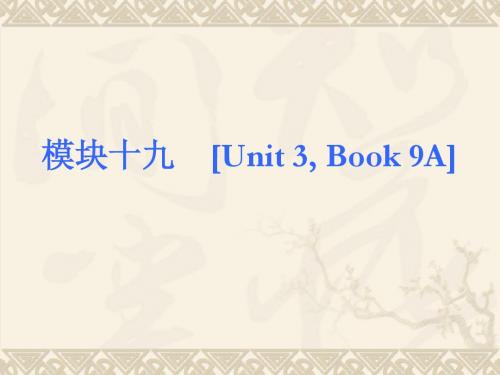
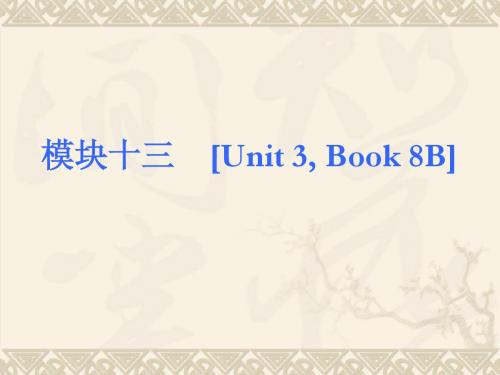
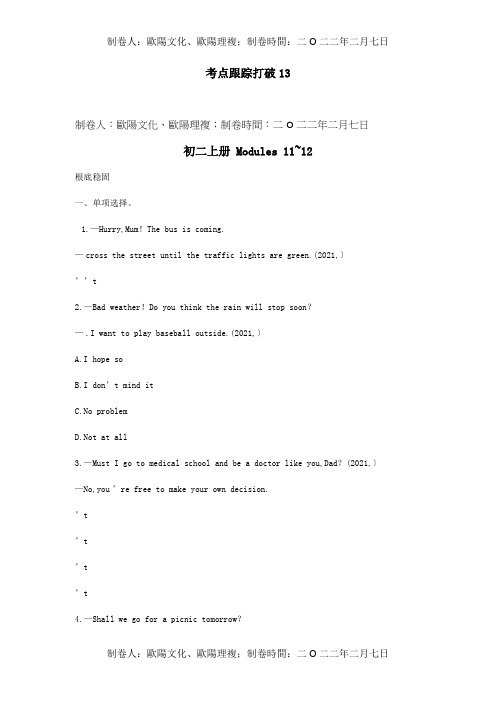
考点跟踪打破13制卷人:歐陽文化、歐陽理複;制卷時間:二O二二年二月七日初二上册 Modules 11~12根底稳固一、单项选择。
1.—Hurry,Mum!The bus is coming.—cross the street until the traffic lights are green.(2021,〕’’t2.—Bad weather!Do you think the rain will stop soon?—.I want to play baseball outside.(2021,〕A.I hope soB.I don’t mind itC.No problemD.Not at all3.—Must I go to medical school and be a doctor like you,Dad?(2021,〕—No,you ’re free to make your own decision.’t’t’t’t4.—Shall we go for a picnic tomorrow?—Well,it all the weather.(2021,〕A.belongs toB.happens toC.depends onD.concentrates on’s nice day today.’s in winter here.7.—What do you think of the football match we will have tomorrow?—difficult for us the match.’re;to win’re;winning’s;to win’s;winning8.Today,when we use QQ or MSN,we messages across thousands of miles in a few seconds.A.speak and talke and acceptC.send and receiveD.ask and answer9.—Did you hear any strange when the quake happened?—No,I was in my garden with my flowers and was enjoying the beautiful of my birdsat that time.(2021,〕A.voice;noiseB.noise;soundC.whisper;soundD.sound;voice10.—What’s the weather like today?—.’s Tuesday’s hot’s a pen’s on the desk二、词汇。
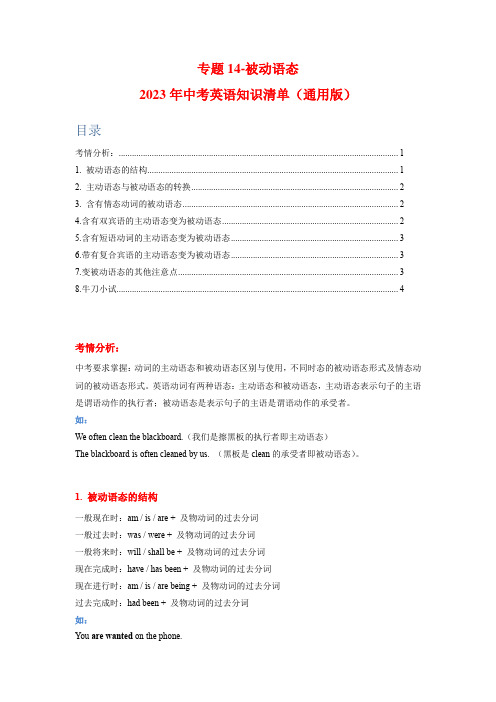
专题14-被动语态2023年中考英语知识清单(通用版)目录考情分析: (1)1. 被动语态的结构 (1)2. 主动语态与被动语态的转换 (2)3. 含有情态动词的被动语态 (2)4.含有双宾语的主动语态变为被动语态 (2)5.含有短语动词的主动语态变为被动语态 (3)6.带有复合宾语的主动语态变为被动语态 (3)7.变被动语态的其他注意点 (3)8.牛刀小试 (4)考情分析:中考要求掌握:动词的主动语态和被动语态区别与使用,不同时态的被动语态形式及情态动词的被动语态形式。
英语动词有两种语态:主动语态和被动语态,主动语态表示句子的主语是谓语动作的执行者;被动语态是表示句子的主语是谓语动作的承受者。
如:We often clean the blackboard.(我们是擦黑板的执行者即主动语态)The blackboard is often cleaned by us. (黑板是clean的承受者即被动语态)。
1. 被动语态的结构一般现在时:am / is / are + 及物动词的过去分词一般过去时:was / were + 及物动词的过去分词一般将来时:will / shall be + 及物动词的过去分词现在完成时:have / has been + 及物动词的过去分词现在进行时:am / is / are being + 及物动词的过去分词过去完成时:had been + 及物动词的过去分词如:You are wanted on the phone.有你的电话。
China was liberated in 1949.1949年中国解放。
The problem will be discussed tomorrow.明天将对这个问题进行讨论。
Not a book in the library has been taken away.图书馆里没有一本书被人拿走。
My bike is being repaired.我的自行车正在修理。

2013中考复习系列一词汇词类知识一、中考要求:词汇是英语的基础,而弄清每一个词的词类是用词、造句、阅读和写作的基础。
词类在中考的考查一般通过在名词、动词、形容词等各种词性的考查中表现出来。
如判断各类词在句子中可以作的成分来决定使用哪个词形,词与词之间的搭配关系等。
二、知识要点:根据语法功能,词可分为十类:名词、代词、动词、形容词、副词、数词、冠词、介词、连词和感叹词。
1. 名词(n.):名词用来表示人、事物或抽象概念,如:boy 男孩,morning 早晨,duty 责任;在句子中主要作主语、表语、宾语、补足语、同位语、定语等。
例如:The tomatoes on the table are very fresh. 桌子上的西红柿很新鲜。
(作主语)He is a doctor. 他是个医生。
(作表语)We’ll call the baby Mary. 我们要给这个婴儿取名玛丽。
(作宾语补足语)2. 代词(pro.):代词用来代替名词或数词,如:we 我们,their 他们的,that 那个,several 几个;在句中主要作主语、宾语、表语、同位语等。
例如:I know her sister. She is always ready to help others. 我认识她妹妹,她乐于助人。
(I和she作主语;her作定语;others作宾语)The English teacher is not himself today. 英语老师今天不舒服。
(作表语)3.数词(num.)数词表示数目和顺序,即基数词和序数词。
如:one 一个,thousand 千,twelfth 第十二;在句子主要作主语、宾语、表语、定语等。
例如:Three of us are from Beijing. 我们中有三个人是北京来的。
(作主语)You are the second one to come to see me. 你是第二个来看我的人。

2012—2013学年度初2013级英语学科试题(时间:120分钟,总分:150分)A 卷(共100分) 第一部分 听力测试(共25小题,计25分)一、听句子,根据所听到的内容选择正确答语。
每小题念两遍。
(共6小题,每小题1分;计6分) 1. A. Are you Mark? B. Nice to meet you. C. I don't know you. 2. A. Is that true? B. That's right. C. I'm sorry to hear that. 3. A. Never mind. B. Thank you . C. That’s great. 4. A. You can't. B. Hold on, please. C. Who are you? 5. A. The same to you. B. Thank you. C.I don’t thin k so. 6. A. Yes, please. B. No, you can’t. C. Yes, this is my seat. 二、听句子,选择与所听到的句子内容相符的图片,并将代表图片的字母填在答题卡的相应位置。
每小题念两遍。
(共4小题,每小题1分;计4分)ABC D7. 8. 9. 10. 三、听对话,根据对话内容问题选择正确答案。
每小题念两遍。
(共10小题,每小题1分;计10分) 11. A. She is a worker. B. She is a policewoman.C.12. A. At 8∶10. B. At 7∶15. C. At 7∶ 13. A. It’s too hot. B. It’s very hot and nice.C. It’s very delicious.14. A. By plane. B. By bus.C. 15. A. Rainy. B. Snowy. C. Windy. 16. A.17. B.20. C.23. 17. A. On the table. B. On the floor. C. In his bag. 18. A. It's expensive. B. It's cheap.C. It's beautiful.19. A. Because the pencil doesn't work.B. Because the pencil is too expensive.C. Because the sharpener doesn't work. 20. A. Tim. B. Jessica. C. Anna. 四、听短文,根据短文内容选择正确答案。

Unit 13 Rainy days make me sad.Ⅰ.Analysis of the Teaching Material1.Status and FunctionIn this unit, students learn to talk about how things affect them.The topic is meaningful and practical to students, It is very useful.It can help students express their own opinions in their daily life.It continues to train students’ speaking ability and integrating skills.After studying this unit, students will be in charge of their attitude and they can do everything better.(1)The first period mainly gives students listening and oral practice using the target language I’d rather go to the Blue Lagoon Restaurant because I like to listen to quiet music while I’m eating.OK, really? Loud music makes me energetic.Not me! Loud music makes me stressed out.(2)The activities in the second period give students more listening and speaking practice as well as grammar focus to practise the target language.The practice can help students improve their listening and speaking skills.(3)The third period provides an article.Students learn to get detailed information from the article.It is a basic reading skill, and also it is of great help for students to improve their reading skill.(4)The fourth period not only introduces some new words but also provides students with many different kinds of activities.In this class, students learn how to express their own opinions using the target language.(5)A lot of practice is designed in the fifth period to train students’reading and writing skills.Students also learn how to treat the advertisement from the reading material.(6)All the activities in the last period in this unit are used to provide writing practice using the target language.2.Teaching Aims and Demands(1)Knowledge ObjectsIn this unit, students learn to talk about how things affect them, and how to express their own opinions using the target language,(2)Ability objectsTo train students’ listening, speaking, reading and writing skills using the target language,(3)Moral ObjectThe impact of attitude on life is obvious.When go shopping, we should remember not all the ads are great.We have to be careful.In this way, we can buy nothing that we don’t need at all.So we shouldbe in charge of our attitude.That way, we can live happily and we can do everything better.3.Teaching Key PointTo make students learn and master the key vocabulary words and the target language.4.Teaching Difficult PointsTo train students’ listening, speaking, reading and writing skills.To train students’ communicative competence.5.Studying WayTeach students how to express their own opinions freely.Ⅱ.Language FunctionTalk about how things affect you.Ⅲ.Target LanguageI’d rather go to the Blue Lagoon Restaurant because I like to listen to quiet music while I’m eating.Oh, really? Loud music makes me energetic.Not me! Loud music makes me stressed out.Ⅳ.StructureSecond conditional with wishⅤ.V ocabularylighting, mysterious, tense, silky, owner, product, knowledge, for instance, shiny,skin, cream, toothpaste, endangered, uncomfortable, usefulⅥ.Recyclingfast food, make, cry, customer, happy, dance, sad, restaurant, red, pink, blue, relaxed, stressed out, awful, soft, energetic, keep outⅦ.Learning Strategies1.Personalizing2.MatchingⅧ.Teaching TimeSeven periodsThe First PeriodⅠ.Teaching Aims and Demands1.Knowledge Objects(1)Key Vocabularysad, energetic, stressed out, soft(2)Target LanguageI’d rather go to the Blue Lagoon Restaurant because I like to listen to quiet music while I’m eating.Oh, really? Loud music makes me energetic.Not me! Loud music makes me stressed out.2.Ability Objects(1)Improve students’ listening ability.(2)Help students to express their opinion freely.3.Moral objectsIt is important to choose a suitable place.It is good for your study and life.Ⅱ.Teaching Key PointTarget LanguageⅢ.Teaching Difficult Points1.How to improve students’ listening ability.2.How to help students to express their opinion freely.Ⅳ.Teaching Methods1.Listening-and-answering activity to help the students go through with the listening material.2.Pairwork to make every student work in class.Ⅴ.Teaching Aids1.A tape recorder2.The blackboardⅥ.Teaching ProceduresStep ⅠRevisionT: Yesterday we finished Unit 12.In this unit, we learned how to tell what we are supposed to do.Now tell me some things that are good to do in school and that are not good to do in school.S1: We’re supposed to do our homework every day.S2: We’re supposed to raise our hands before we talk.S3: We’re supposed to come to class on time.S4: We are not supposed to be late for class.S5: We’re not supposed to eat in class.T: Very good.You’re right.From now on, we’ll learn Unit 13.Look at the following list of activities on the blackboard: parties, exams, school vacations, gym class.How do you feel about parties? Happy?Excited? Nervous?S1: Nervous.T: Oh, so parties make you nervous.S1: Yes.T: Class repeat.Parties make me nervous.S s: Parties make me nervous.T: Now what about school vacations?How do you feel about them?S2: Happy.T: So, school vacations make you happy.S2: Yes.T: Class repeat.School vacations make me happy.S s: School vacations make me happy.T: Now what about gym class? How do you feel about it?S3: Excited.T: So gym class makes you excited.S3: Yes.StepⅡ1aThis activity introduces new vocabulary and provides oral practice using the target language.Go through the instructions and look at the two pictures.Ask, Who can describe the interior of each restaurant? (Rockin Restaurant has red walls, ugly paintings on the walls, and loud music.The Blue Lagoon has blue walls, plants, flowers, and a piano player.)Say, Which restaurant would you rather go to? Talk about it with your parter.Let students work in pairs, and tell each other which restaurant they would like to go to and why.When students work, go around the classroom offering help as needed.When they have finished talking to each other, call out several pairs to say their conversations to the class.Sample conversationS A: Which restaurant would you like to go to?S B: I’d like to go to the Blue Lagoon.S A: Why?S B: Because there are plants and flowers there.Step Ⅲ1bThis activity gives students practice in understanding the target language in spoken conversation.Ask students to read the instructions.Look at the chart and point out the two headings: The Rockin’Restaurant and The Blue Lagoon.Look at the sample answer.Let a student read the completed sentence, and then say, You will hear the missing words on the recording.Fill in the blanks with the words you hear on the tape.Play the recording the first time.Students only listen carefully.Play the recording again.This time fill in the missing words.Check the answers with the whole class.AnswersThe Rockin’ Restaurant: sad, tenseThe Blue Lagoon: relaxed, sleepyTapescriptGirl 1: I’m hungry, Amy.Girl 2: So am I.Why don’t we get something to eat?Girl 1: Yeah.Let’s go to the Rockin’ Restaurant.I love their hamburgers.Girl 2: Oh, Tina…I hate the Rockin’ Restaurant.Girl 1: Why? The food is great, isn’t it?Girl 2: The food’s fine.I just don’t like the atmosphere.Those awful pictures on the walls make me sad, and the loud music makes me tease.Girl 1 :OK.So where do you want to go, Amy?Girl 2: Let’s go to the Blue Lagoon.The soft music makes me relaxed.Girl 1: Not me.It makes me sleepy.Step Ⅳ1cThis activity provides guided oral practice using the target language.Look at the example in the box.Invite a pair of students to read it to the class.S A: I’d rather go to the Blue Lagoon Restaurant because I like to listen to quiet music while I’m eating.S B: Oh, really? Loud music makes me energetic.S A: Not me! Loud music makes me stressed out.Go through the instructions with the class.Tell students they will be talking about their own opinions with a partner.Look back at the chart in Activity 16.Make up a conversation with a partner using words from the chart, such as awful pictures, loud music and soft music.While students are working in pairs, walk around the classroom, and listen to some pairs.If necessary, offer language support.Then ask some pairs to act out their conversations in front of the whole class.Optional activityLet students look around the classroom, think about other rooms in the school, and talk about how these places make the students feel.For example, what are your opinions about this room? A student might answer, This room is sunny.It makes me happy.Or ask them.What are youropinions about all the noise in the cafeteria? A student might say.All the noise in the cafeteria makes me tense.Notes:1.awful——terrible。

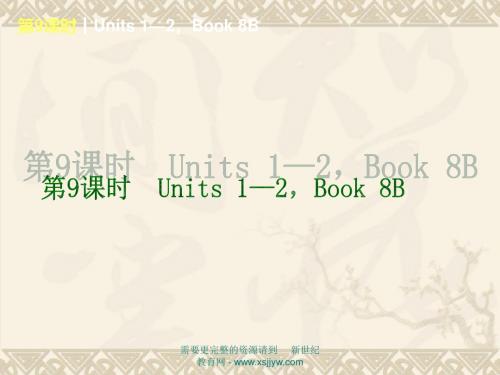
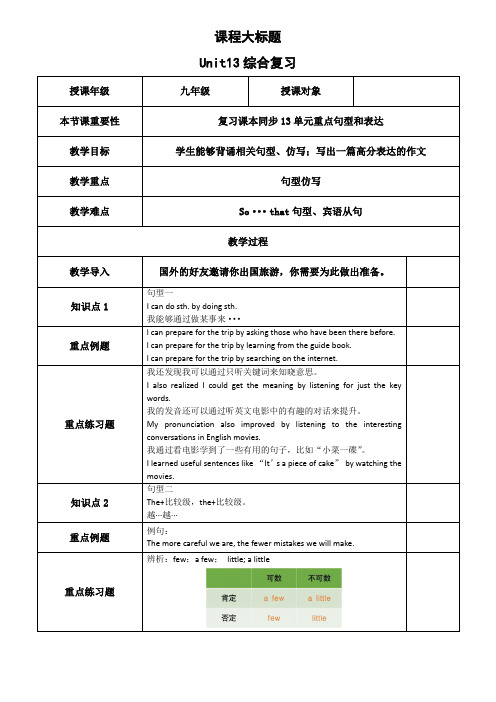
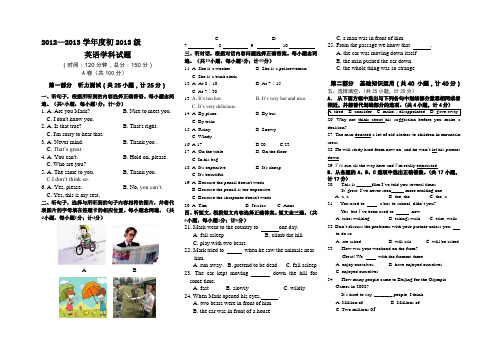
2012—2013学年度初2013级英语学科试题(时间:120分钟,总分:150分)A 卷(共100分) 第一部分 听力测试(共25小题,计25分)一、听句子,根据所听到的内容选择正确答语。
每小题念两遍。
(共6小题,每小题1分;计6分) 1. A. Are you Mark? B. Nice to meet you. C. I don't know you. 2. A. Is that true? B. That's right. C. I'm sorry to hear that. 3. A. Never mind. B. Thank you . C. That’s great. 4. A. You can't. B. Hold on, please. C. Who are you? 5. A. The same to you. B. Thank you. C.I don’t think so. 6. A. Yes, please. B. No, you can’t. C. Yes, this is my seat. 二、听句子,选择与所听到的句子内容相符的图片,并将代表图片的字母填在答题卡的相应位置。
每小题念两遍。
(共4小题,每小题1分;计4分)ABC D7. 8. 9. 10. 三、听对话,根据对话内容问题选择正确答案。
每小题念两遍。
(共10小题,每小题1分;计10分) 11. A. She is a worker. B. She is a policewoman.C.12. A. At 8∶10. B. At 7∶15. C. At 7∶ 13. A. It’s too hot. B. It’s very hot and nice. C. It’s very delicious. 14. A. By plane. B. By bus.C. 15. A. Rainy. B. Snowy. C. Windy. 16. A.17. B.20. C.23. 17. A. On the table. B. On the floor. C. In his bag. 18. A. It's expensive. B. It's cheap.C. It's beautiful.19. A. Because the pencil doesn't work.B. Because the pencil is too expensive.C. Because the sharpener doesn't work. 20. A. Tim. B. Jessica. C. Anna. 四、听短文,根据短文内容选择正确答案。
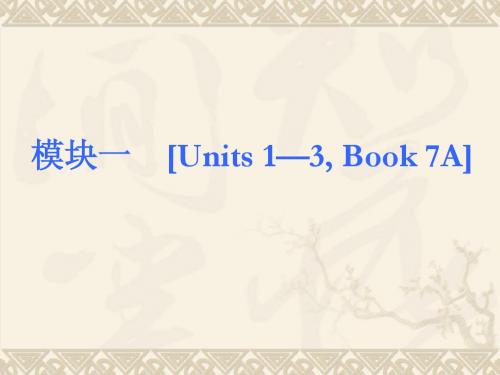
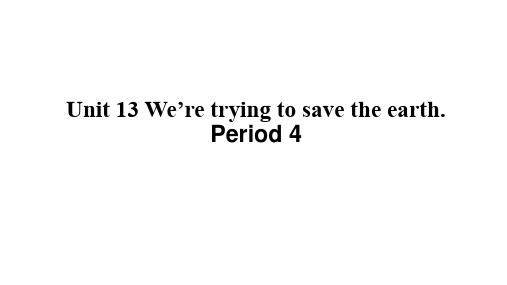
2013中考复习系列一词汇词类知识一、中考要求:词汇是英语的基础,而弄清每一个词的词类是用词、造句、阅读和写作的基础。
词类在中考的考查一般通过在名词、动词、形容词等各种词性的考查中表现出来。
如判断各类词在句子中可以作的成分来决定使用哪个词形,词与词之间的搭配关系等。
二、知识要点:根据语法功能,词可分为十类:名词、代词、动词、形容词、副词、数词、冠词、介词、连词和感叹词。
1. 名词(n.):名词用来表示人、事物或抽象概念,如:boy 男孩,morning 早晨,duty 责任;在句子中主要作主语、表语、宾语、补足语、同位语、定语等。
例如:The tomatoes on the table are very fresh. 桌子上的西红柿很新鲜。
(作主语)He is a doctor. 他是个医生。
(作表语)We’ll call the baby Mary. 我们要给这个婴儿取名玛丽。
(作宾语补足语)2. 代词(pro.):代词用来代替名词或数词,如:we 我们,their 他们的,that 那个,several 几个;在句中主要作主语、宾语、表语、同位语等。
例如:I know her sister. She is always ready to help others. 我认识她妹妹,她乐于助人。
(I和she作主语;her作定语;others作宾语)The English teacher is not himself today. 英语老师今天不舒服。
(作表语)3.数词(num.)数词表示数目和顺序,即基数词和序数词。
如:one 一个,thousand 千,twelfth 第十二;在句子主要作主语、宾语、表语、定语等。
例如:Three of us are from Beijing. 我们中有三个人是北京来的。
(作主语)You are the second one to come to see me. 你是第二个来看我的人。
(作定语)We don’t need so many people. We need only five.我们不需要这么多人,我们只需要五个。
(作宾语)4. 形容词(adj.)形容词表示人或事物的特征,如big 大的,white白色的;在句中主要作表语、定语、补足语等。
Look! Your bike is bigger than mine. 看,你的自行车比我的大。
(作表语)He found the door open. 他发现门是开着的。
(作宾语补足语)5. 副词(adv.)副词表示时间、地点、程度、动作特征等,如:now 现在,often 经常,quietly 安静地;在句中主要作状语,修饰形容词、副词、动词、句子等。
例如:She can sing very well. 她歌唱得非常好。
(修饰副词well)He stepped into the room quietly without being noticed.他悄悄地走进房间,没有人注意到他。
(修饰动词stepped) 6. 动词(v.)动词用来表示动作或状态,如:speak 说,lie 躺,become 成为;在句中主要作谓语或与名词、形容词、实义动词等一起构成复合谓语。
例如:He bought a computer yesterday. 他昨天买了一台电脑。
(作谓语)Tom was sick at home. 汤姆有病在家。
(与形容词一起构成复合谓语)7. 冠词(art.)冠词用于名词前,对名词起限制作用,包括不定冠词a/ an 一个,定冠词the 这/那个,这/那些。
There are some vegetables in the basket. 篮子里有些蔬菜。
8. 介词(prep.)介词用于名词或代词前,表示与其他词的关系。
如on 在……上面,for 为……。
I have waited here for three hours. 我在这里等了三个小时了。
9. 连词(conj.)连词用于连接词与词、短语与短语或句子与句子,如and 和,but 但是,when 当……时候。
We talked and talked until he came. 我们一直谈到他来。
10. 感叹词(interj.)感叹词用来表示说话时的感情或口气。
如:hi 嗨,hello 喂,aha 啊哈,wow 哇。
Ah, here is the thing I’m after. 啊,我找的东西在这里呢。
三、易错点点拨:1. 形容词和副词用法混淆,例如:Children on the playground are playing happy. 操场上的孩子们高兴地玩着。
〔解析〕happy 是形容词,这个句子应该用副词修饰动词,应改为happily。
When his father heard this, he got angrily. 他爸爸听到这,就生气了。
〔解析〕get是系动词,后面要接形容词表示主语的状态,angrily应改为angry。
Look! It is raining hardly outside. 外面雨下得很大。
〔解析〕副词hard(猛烈地)误用为hardly(几乎不)。
再如容易错误的把friendly、lovely等形容词当作副词来使用。
2. 连词和副词用法混淆,例如:We were very tired, however, we felt excited. 我们很累,但是很兴奋。
〔分析〕however是副词,不能连接句子,应把however, 改为but,或者改为:We were very tired。
However, we felt excited.3. 介词和副词用法混淆,例如:He told me the teacher asked me to come into. 他告诉我老师让我进去。
〔解析〕into是介词,应该接宾语,否则就应该用in代替into。
也可以改成come into the classroom。
总之,英语的词类在英语应用中起着很大作用,尤其在书面表达中,而且也是中考经常考查的内容,如在用所给词的正确形式填空中就经常出现词类转换的例子。
构词法知识一、中考要求:中考关于构词法的要求是:了解合成词、派生词构成的基本知识,掌握一定的单词转化规则;最经常用到的单词前缀和后缀变化;了解一些合成词的构成及用法等。
二、知识要点:1.合成法:合成法是英语单词的最基本的构词法。
它通常由两个单词合在一起构成与这两个单词意思有关系和联系的新单词。
合成词的特点是:两个单词合在一起构成新的单词,有时要加连字符,有时可能有一些词形方面的变化。
例如:class + room -classroom 教室black + board -blackboard 黑板bath + room -bathroom浴室day + dreaming -daydreaming 白日梦kind + heart+ ed -kindhearted 好心的good + look+ ing -good-looking 好看的man + made -man-made 人造的well + known -well-known著名的掌握合成法的构词方法会对单词的记忆和生词的推测有很大帮助,例如:〔例句〕What’s the meaning of the underlined sentence?〔解析〕这个句子是阅读理解题中经常出现的一个问题,underlined可能对一些同学来说是个生词。
我们可以看出它是由under和line加上-d构成的,因此很容易猜出词义是“下面划线的”。
2. 派生法派生法是英语构词法最广泛的,也是最常用的方法。
派生词包括加前缀和后缀两种形式。
前缀:是在单词的前面加的某些固定的字母组合,经常见到的前缀有im-,un-,dis-,in-,a-,tele-等。
其中im-,un-,dis-,in-,一般构成反义词。
例如:honest 诚实的-dishonest 不诚实的possible 可能的-impossible 不可能的happy 高兴的-unhappy 不高兴的polite 有礼貌的-impolite 没有礼貌的〔例句〕It is _____ (possible) for you to write such a long novel in an hour. It may take you one day.〔解析〕答案是impossible。
从后面句子的意思“可能要花一天时间”理解一个小时写如此长的小说是不可能的,所以加前缀构成反义词impossible,表示“不可能的”,这样前后句子的意思保持一致。
〔例句〕They don’t like your brother because he is a very______ (honest) boy.〔解析〕答案是dishonest。
从前面句子的意思“他们不喜欢你的弟弟”可以理解后面的句子是加前缀构成的dishonest表示“不诚实”的意思,表示不喜欢的原因。
后缀:后缀是在单词的后面加的某些固定的字母组合。
经常见到的后缀有:(1)名词后缀:-er,-or,-tion,-ian,-ment,-ness等。
例如:art 艺术-artist 艺术家move 移动-movement 运动educate 教育-education 教育teach 教-teacher 教师act 表演-actor 男演员translate 翻译-translation 翻译〔例句〕Three ______ (visit) will come to our village and teach us English.〔解析〕答案是visitors。
从句子的意思可以理解是三个“参观者”,所以在visit的后面加后缀变为名词visitors。
(2)副词后缀:一般由形容词+ly或-ward(s)等后缀变为副词。
例如:easy容易的-easily容易地heavy大的、重的-heavily 沉重地、很重地〔例句〕Look! It is raining ________ (heavy) outside now.〔解析〕答案是heavily。
从句子的结构可以看出应该用副词修饰动词rain,heavy的副词是变y为i,加后缀-ly构成。
(3)形容词后缀:一般由名词+-y,-able,-ful,-ive,-less,-al等后缀构成形容词。
如表示天气的名词加后缀-y构成形容词:rain雨-rainy有雨的wind风-windy有风的cloud云-cloudy多云的〔例句〕What’s the weather like today? It’s ______ (fog).〔解析〕答案是foggy。